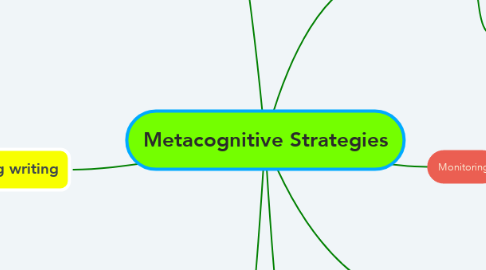
1. Reading Comprehension
1.1. Pre-reading
1.1.1. Prior knowledge
1.1.2. Predict
1.1.3. Plan
1.2. Reading
1.2.1. Connection
1.2.2. Monitor understanding
1.2.3. Test hypotesis
1.3. Post-reading
1.3.1. Check understanding
1.3.2. Clarify any question
1.3.3. Plan for further learning
2. Teaching writing
2.1. Explicit instruction
2.1.1. Adequate time
2.1.2. Learning style
2.1.3. Groups same skills
2.1.4. Teacher motivates to write
2.2. Writing letters, words, sentences
2.2.1. Students organize ideas
2.2.2. Use acronyms
2.3. Understanding of writing process
2.3.1. Recall strategies
2.3.2. Plan, draft and finalize projects
2.3.3. Learn different types of writing texts
2.4. Writer composes text
2.4.1. Planning
2.4.2. Drafting
2.4.3. Sharing
2.4.4. Evaluating
2.4.5. Revising
2.4.6. Editing
3. Speaking skills develop
3.1. Organizing concept
3.2. Develop attention
3.3. Selective attention
3.4. Functional planning
3.5. Delayed production
3.6. Self-evaluation
4. Planning
4.1. What I know?
4.2. What I want o know?
4.3. How will find out?
4.4. What I have learned?
5. Monitoring
5.1. How is my language comprehension?
5.2. How is my output?
5.3. How I feel now?
5.4. Is the strategy applied correctly?
6. Evaluate
6.1. What I know now?
6.2. What I still need to know?
6.3. How did I found out?
7. Technology in developing speaking skills
7.1. Upload
7.1.1. Speaking performance
7.1.2. Check on voice tone, emotion,
7.2. Share
7.2.1. Self-reflection upon speaking task
7.2.2. It's important to speak naturally
7.3. Comment
7.3.1. Other performances
7.3.2. Help to improve speaking skills
